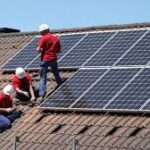
In zijn recente essay, ‘2016 het jaar van inzicht en 2017 het jaar van de praktijk?‘, stelde Dolf van Wijk dat de rationele, op waarnemingen gebaseerde argumenten van de klimaatsceptici tot op heden het klimaatdebat niet substantieel hebben kunnen doen kantelen. Hij schreef dit toe aan de invloed van een kongsi van belangen.
De zittende macht, nauw samenwerkend met de milieubeweging die door die zittende macht beschermd en versterkt wordt, academici die de juiste boodschappen voor de zittende macht produceren die hun subsidiëring veilig stellen en de bevestigende onkritische massa-media die alles de maatschappij instuurt zodat de massa het gewenste verhaal gelooft en accepteert. Die combinatie van gevestigde macht en gevestigde belangen blijkt zeer succesvol in het in leven te houden van de alarmistische versie van de rol van de mens op het klimaat, ondanks de wankele wetenschappelijke basis.
De komst van de nieuwe klimaatsceptische Amerikaanse president, Donald Trump, zal hier naar verwachting verandering in brengen.
Onder de titel, ‘How the “Trump Effect” Could Undermine Germany’s Clean Energy Revolution’, speculeerde Aaron Wiener op de Amerikaanse website ‘Mother Jones’ over wat het effect van de Trump-revolutie zou kunnen zijn op de Duitse ‘Energiewende’.
The world’s most advanced energy revolution has hit an obstacle: the Trump effect.
Germany has long been a clean energy pioneer. Despite the fact that the sun hardly shines there, the country was the world leader in installed solar capacity until it was finally overtaken last year by China, a vastly larger and sunnier country. By 2050, Germany aims to get 80 percent of its electricity from renewable sources and to cut its greenhouse gas emissions by as much as 95 percent. It currently derives about one-fifth of its power from wind and solar (and one-third from total renewables), compared to just 5 percent in the United States. Even though this dramatic energy transition—known as the Energiewende—has contributed to higher household electricity costs, 90 percent of Germans say they support it.
For years, Germany’s mainstream political parties have supported clean energy, too. But that broad consensus could soon face a significant test, another possible casualty of the resurgence of right-wing, nativist politics across the Western world. Unlike many of its neighbors, Germany hasn’t had a far-right party represented in its parliament since the Second World War. But that’s almost certain to change next year, when national elections could make the Alternative for Germany party (known by its German acronym, AfD) the second- or third-strongest faction in the government, if polling trends continue. The party, which began as a euro-skeptic movement, has built its success on stringent opposition to immigration and admission of refugees—and on inflammatory rhetoric that echoes the campaign of Donald Trump.
The AfD also opposes Germany’s clean energy policies. It’s calling for an end to the law behind the Energiewende and even questions the existence of human-induced climate change, stating on its website, “Scientific research on the long-term development of the climate because of man-made CO2 emissions is fraught with uncertainty.” Now, in an effort to slow the AfD’s rapid rise, the country’s mainstream parties could be poised for a step back in the fight against global warming. …
During the US presidential campaign, Trump promised to bring coal-mining jobs back to Appalachia (and bashed alternative energy sources like wind). Voters in the region—parts of which were once Democratic strongholds—responded enthusiastically. They waved “Trump Digs Coal” signs at rallies and voted for him by overwhelming margins. Market forces will make Trump’s coal promises nearly impossible to keep, but his victory is already having a very real impact in Germany. Politicians there are looking at Trump’s success among disaffected voters in coal country and seeing similar fears among their own constituencies in areas where coal production is being phased out.
Trump’s election capped a year of successes for the populist right that has left mainstream politicians scrambling to shore up their support. There was the British vote to exit the European Union, the resignation of Italy’s prime minister, the near-victory of a right-wing extremist in Austria, and the growing strength of the far right in France. Merkel, dubbed the “liberal West’s last defender” by the New York Times, is now facing her own insurgency in the form of the AfD. And so she and her coalition partners, the center-left Social Democrats, are tacking to the right to bolster their eroding support. …
The biggest effect is likely to be on immigration and refugee policy: Earlier this month, Merkel proposed a ban on the face veils worn by some Muslim women. Anti-refugee sentiment has only climbed since then with the attack on a Berlin holiday market last week; the chief suspect is a Tunisian asylum seeker.
But clean energy advocates worry that the Energiewende could suffer as well. “My biggest fear is that the conservatives [in Merkel’s center-right Christian Democratic Union] get so nervous that they also move to the right,” says Annalena Baerbock, a member of the German parliament and the Green Party’s parliamentary spokeswoman on climate policy. …
Sigmar Gabriel, Germany’s economy and energy minister and the Social Democrats’ party chairman, rejected calls this summer for a rapid phaseout of coal. In October, he said he expects Germany to continue burning lignite into the 2040s. (“That’s absolutely hilarious,” responds Umpfenbach, “because how will we reduce emissions by 95 percent if we still have coal?”)
Hubertus Heil, vice chairman of the Social Democrats’ parliamentary group, said recently that if people in coal-producing regions were presented with an end date for the use of coal without a plan for economic assistance, “you might as well send them to the AfD right away.” (The Social Democrats’ press spokeswoman did not respond to a request for comment.)
Lees verder hier.
Commentaar van Eric Worrall op WUWT:
Mother Jones thinks spillover from the US election is helping the rise of the German AFD, and undermining support for Green Energy. But perhaps the working class has simply grown tired of elitist left wing politicians and institutions ignoring working class priorities. …
I’ve got a working class background, plenty of my friends are working class. Over the years I’ve watched as various left wing Labor and Democrat parties became the plaything of the urban elites, champaign socialists. I’ve watched the growing dismay and anger, as left wing elitist politicians supported fashionable green efforts to drive up the price of energy, and flood western countries with cheap immigrant labor, regardless of the pain these efforts inflicted on their increasingly disillusioned working class supporters.
Trump didn’t ignite the anger of the working class, he simply offered a solution to their problems, a new direction. The AFD didn’t ignite the anger of the German working class, they just pointed out the problems, and promised to fix them. The “Trump Effect” is simply the end of working class patience with privileged left wing politicians who have no idea of the pain their ignorant internationalist green posturing has caused to the people they claim to champion.
For Germany, the writing was on the wall long before Trump, as this hilarious video from 2014 demonstrates.
Aldus Eric Worrall.
Lees verder hier.
En zou het Nederlandse klimaat- cum energiebeleid nog door de komst van Trump worden beïnvloed? Na 15 maart weten we meer.
Voor mijn eerdere bijdragen over klimaat en aanverwante zaken zie hier, hier, hier, hier en hier.






Als je wilt beginnen met een discussie gebaseerd op feiten dan zou je eerst eens moeten beginnen met het toegeven dat de zon niet verantwoordelijk is voor de recente opwarming en dat er binnenkort geen afkoeling komt en toegeven dat, ondanks de vele herhalingen, de opwarming niet gestopt is.
Maar dankzij ons beleid hebben we in Nederland van Den Helder tot Maastricht al 20 jaar geen significante opwarming: http://klimaatgek.nl/wordpress/ Wat zijn we toch knap hier in Nederland ;-)
Ja, dat is gebaseerd op metingen, niet op voorspellingen.
Misschien toch nog eens naar het schooltje en leren dat
1 de wereld niet gelijk is aan Nederland
2 95% van de opwarming wordt opgenomen door de oceanen die duidelijk laten zien dat er geen sprake is van een stop
Zeg Henk, dit blog gaat over het Trump effect op de energiewende. Volgens mij ben je een beetje van het padje.
Op dat schooltje zou je hebben geleerd, dat oceanen energie van extra infrarood straling nagenoeg niet kunnen opnemen en ook niet omdat de mindguards van realclimate, etc, vinden dat dat wel moet kunnen. Energie van zichtbaar licht, zoals de zon afgeeft dan weer wel.
Frank,
Hans begint met klagen dat de sceptici niet serieus genomen worden en ik ga in op waarom dat zo is.
Ook in het tijdperk Trump blijven er veel mensen die het liefst beginnen met het vaststellen van de feiten voordat ze de mening van iemand serieus nemen en aangezien Hans de feiten niet wil accepteren zal zijn mening voor de meeste mensen het ene oor in en het andere oor uit gaan
Als het in de hele wereld opwarmt, waarom in Nederland niet? Het IPCC heeft toch niet de toekomst geprojecteerd met uitzondering van Nederland? Wat maakt Nederland dan anders?
Tot nu toe heeft niemand mij kunnen uitleggen waarom tot 1998 de luchttemperatuur toenam en daarna de watertemperatuur. Wat is er de oorzaak van dat de luchttemperatuur niet meer toeneemt? Welk natuurkundig principe zit daarachter?
Ik heb dit blog met instemming gelezen. Ik ben benieuwd of het
Trump effect een rol gaat spelen in de uitvoering van het Nederlandse
klimaat akkoord.
En vooral naar het vonnis in hoger beroep over dit akkoord.
http://klimaatgek.nl/wordpress/2016/12/13/nepnieuws/
Nepnieuws van volkskrant en D66.
Een goed artikel over wat hopelijk van doorslaggevende invloed zal zijn op het Europese beleid. Het Trump-beleid zal uiteraard geen zichtbare effecten hebben op de ontwikkeling van het klimaat. Ik hoop niet dat de zittend macht en de alarmisten dit als argument zullen gebruiken. Simon Rozendaal’s jongste boek, waar Dolf gisteren o.a. aan refereerde, laat dit veelzeggende standpunt zien van een Greenpeace’er die aangevoerde feiten niet meer kan ontkennen en zegt: dit erkennen, zou ons ongeloofwaardig maken. Het gaat inderdaad niet om feiten, maar om macht en angst voor gezichtsverlies. Ik ben bang dat de het Dunning-Kruger-effect nog sterk zal blijven https://nl.wikipedia.org/wiki/Dunning-Krugereffect
Dit schreven Dunning en Kruger:
‘niet falsificatie doet paradigma’s verschuiven, maar alleen de autoriteit van de zittende macht. En zolang die hun falen niet in wil zien, zullen sceptici niet slagen in het omverwerpen van de bestaande theorieën door middel van contrabewijzen en falsificaties. Popper’s principe dat elke theorie bij één falsificatie ongeldig is klopt in principe, maar geldt helaas niet in de praktijk.’
2017 belooft ook in dit opzicht een belangwekkend jaar te worden.
@Hetzler het smeltend ijs!! aan de polen is in dit geval de ‘autoriteit’ Ik las vandaag wel een aardig artikel van een ‘poolvorser’. Dat is iemand die al tachtig reizen heeft gemaakt naar dat gebied. Die heeft niks met Poppers principes….die kijkt om zich heen. ‘Ockham’ Heztler daar gaat het om….
Het is uit de Dailymail…een blad dat hier graag geciteerd wordt…dus ik zou zeggen lezen.
http://www.dailymail.co.uk/wires/pa/article-4081246/Adventurer-urges-action-climate-change-Arctic-reaches-tipping-point.html
@Olivat Het is altijd goed om het historisch perspectief er bij te halen: http://climategate.nl/2016/11/23/postmoderne-doemprofeten/
Ik vrees dat je amygdala je parten spelen zoals bij velen. Deze maatschappij is bezeten door meer angst naarmate het beter gaat met deze wereld. Ik vind dit onrealistisch en irrationeel. Dit laatste kenmerkt dan ook uw commentaar.
@Hetzler even een vraagje. Beschouwt u het ‘Deltaplan’ ook als een plan waarbij de amygdala ons allen parten (heeft gespeeld) speelt?
Maakt u zich over mij geen zorgen, ik ben in het geheel niet angstig aangelegd.
Ik ben slechts nieuwsgierig van aard en vraag me af hoe het bijvoorbeeld komt dat gletschers en zeeijs voortdurend in volume afnemen.
De diskussie ook op deze site staat telkens maar weer bol van ‘psychologismes’ die inderdaad een objectieve waarneming en interpretatie in de weg staan.
Zo staan uw betogen regelmatig bol van ‘politiek ideologische amygdala’s ‘.
@Hetzler een vraagje, Beschouw jij de Deltawerken (toen en nu) ook als iets waarbij de ‘amygdala’ ons parten hebben gespeeld?
Waarom anders dan door angst zou een volk zich laten leiden voor iets dat maar eens in de 1000 (ofzo) jaar zal voorkomen?
“….’onrealistisch en irrationeel….’ Veel gedoe dus en zonde van het geld dus volgens jou.
Maak je trouwens over mij geen zorgen, ik ben niet bang en maak me ook al geen zorgen over mijn toekomst.
Ik wil alleen weten waarom dat ijs overal maar wegsmelt.
Dunning en Kruger in actie